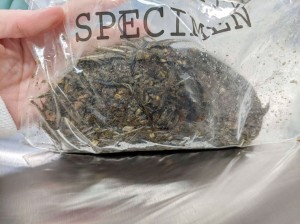-
Recent Posts
Archives
- October 2022
- August 2022
- May 2022
- March 2022
- January 2022
- December 2021
- September 2021
- July 2021
- June 2021
- May 2021
- April 2021
- February 2021
- January 2021
- November 2020
- October 2020
- September 2020
- June 2020
- April 2020
- March 2020
- February 2020
- January 2020
- December 2019
- November 2019
- October 2019
- September 2019
- June 2019
- March 2019
- February 2019
- January 2019
- December 2018
- November 2018
- October 2018
- August 2018
- July 2018
- June 2018
- May 2018
- April 2018
- March 2018
- February 2018
- January 2018
- December 2017
- November 2017
- October 2017
- September 2017
- August 2017
- July 2017
- June 2017
- May 2017
- April 2017
- March 2017
- February 2017
- January 2017
- December 2016
- November 2016
- August 2016
- July 2016
- June 2016
- May 2016
- April 2016
- March 2016
- February 2016
- January 2016
- December 2015
- November 2015
- October 2015
- September 2015
- August 2015
- July 2015
- June 2015
- May 2015
- April 2015
- March 2015
- December 2014
- June 2014
- May 2014
- April 2014
- November 2013
- September 2013
- August 2013
- July 2013
- June 2013
- May 2013
- March 2013
- January 2013
- November 2012
- October 2012
- July 2012
- December 2011
- November 2011
- October 2011
- September 2011
- August 2011
- July 2011
- June 2011
- May 2011
- April 2011
- March 2011
- February 2011
- January 2011
- December 2010
- November 2010
Categories
Surgery Success: Chewy
 When Chewy began having trouble with his back legs, his parents took him to his regular veterinarian. As his situation continued getting worse, he was referred to our Neurology team in Robbinsville. Shortly after arrival, an MRI revealed that Chewy had a herniated disc in his lower back. The disc material was compressing the spinal cord, creating tremendous discomfort and affecting his ability to walk. Chewy’s medical team performed a surgery called a hemilaminectomy, during which the herniated disc material was removed and the compression to his spinal cord relieved. Surgery went well, and little Chewy was able to go home feeling much better, but not before celebrating his birthday with our team during his stay!
When Chewy began having trouble with his back legs, his parents took him to his regular veterinarian. As his situation continued getting worse, he was referred to our Neurology team in Robbinsville. Shortly after arrival, an MRI revealed that Chewy had a herniated disc in his lower back. The disc material was compressing the spinal cord, creating tremendous discomfort and affecting his ability to walk. Chewy’s medical team performed a surgery called a hemilaminectomy, during which the herniated disc material was removed and the compression to his spinal cord relieved. Surgery went well, and little Chewy was able to go home feeling much better, but not before celebrating his birthday with our team during his stay!
Posted in Pets, Veterinary Medicine
Tagged Chewy, hemilamenctomy, herniated disc, NorthStar VETS, Veterinary Neurology
Leave a comment
Surgery Success: Louie
Born in Mississippi, little Louie suffered trauma around two weeks of age when his own mother bit his head for unknown reasons. The injury caused multiple fractures to Louie’s jaw and skull which led to irregular facial growth, and a large palatal defect (an open hole between the roof of his mouth and nasal cavity).
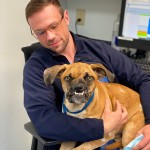 Multiple attempts were made by doctors to correct Louie’s injuries before his adoption into a new home in New Jersey. Louie’s new humans eventually brought him to see the Dental and Oral Surgery team at NorthStar VETS around five months of age. A multi-step plan was put into place to correct his most severe issues. In one of his first procedures, a CT scan was performed and some damaged teeth were removed. The scan provided additional images of Louie’s mouth and clarified the way for the next phase of surgery. Six weeks later, tissue flaps were developed and a bone membrane was implanted to enclose the hole, and at his four-week recheck, everything was healing nicely!
Multiple attempts were made by doctors to correct Louie’s injuries before his adoption into a new home in New Jersey. Louie’s new humans eventually brought him to see the Dental and Oral Surgery team at NorthStar VETS around five months of age. A multi-step plan was put into place to correct his most severe issues. In one of his first procedures, a CT scan was performed and some damaged teeth were removed. The scan provided additional images of Louie’s mouth and clarified the way for the next phase of surgery. Six weeks later, tissue flaps were developed and a bone membrane was implanted to enclose the hole, and at his four-week recheck, everything was healing nicely!
We are happy to report that Louie can now move forward to live his best and happy life.
Surgery Success: Happy
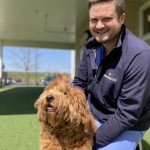 Happy had been having some concerning symptoms for two months. His hind legs became clumsy, his back hunched, and he could not play. An X-ray at his family veterinarian showed multiple rare bone lesions on his spine. He was referred to NorthStar VETS where the Neurology and Radiology teams performed an MRI and noted that one of the growths was compressing the spinal cord, creating pain and weakness.
Happy had been having some concerning symptoms for two months. His hind legs became clumsy, his back hunched, and he could not play. An X-ray at his family veterinarian showed multiple rare bone lesions on his spine. He was referred to NorthStar VETS where the Neurology and Radiology teams performed an MRI and noted that one of the growths was compressing the spinal cord, creating pain and weakness.  It was determined that surgery was the best option, and the Neurology team used a custom 3D-printed model to plan their approach. Days later, Happy underwent a successful surgery in which the growth was removed and the spinal cord was no longer pinched. When he woke up, Happy lived up to his name, showing us his delightful personality and youthful zest for life. His recovery with the nursing team went well, and Happy loved going outside to walk around. He went home where he is expected to live a long, active, and happy life.
It was determined that surgery was the best option, and the Neurology team used a custom 3D-printed model to plan their approach. Days later, Happy underwent a successful surgery in which the growth was removed and the spinal cord was no longer pinched. When he woke up, Happy lived up to his name, showing us his delightful personality and youthful zest for life. His recovery with the nursing team went well, and Happy loved going outside to walk around. He went home where he is expected to live a long, active, and happy life.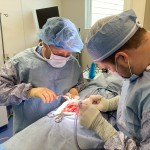
Posted in Pets, Veterinary Medicine
Tagged 3D printing, dog, dylan fry, happy, neurology, NorthStar VETS, spinal surgery
Leave a comment
Surgery Success: Diamond
 Diamond had a serious problem: she suddenly couldn’t get food through her system. Unlike humans, when chickens swallow food, it goes into a storage sack along the side of their neck called a crop. From there, it goes bit-by-bit into a stomach-like proventriculus before moving on to the ventriculus, which crunches up food so it’s ready for the intestines. With Diamond, some dietary indiscretion (mainly grass and feathers), plugged the crop’s exit, so everything she ate after that filled the sack until it was a large pendulous lump in front of her chest. The Avian and Exotics team at NorthStar VETS performed a successful surgery in which they opened Diamond’s crop, pulled out the large grass and feather clump along with her undigested food, flushed everything out, ensured there were no other issues, and closed her back up. Now Diamond is back home hunting and pecking with the rest of her flock.
Diamond had a serious problem: she suddenly couldn’t get food through her system. Unlike humans, when chickens swallow food, it goes into a storage sack along the side of their neck called a crop. From there, it goes bit-by-bit into a stomach-like proventriculus before moving on to the ventriculus, which crunches up food so it’s ready for the intestines. With Diamond, some dietary indiscretion (mainly grass and feathers), plugged the crop’s exit, so everything she ate after that filled the sack until it was a large pendulous lump in front of her chest. The Avian and Exotics team at NorthStar VETS performed a successful surgery in which they opened Diamond’s crop, pulled out the large grass and feather clump along with her undigested food, flushed everything out, ensured there were no other issues, and closed her back up. Now Diamond is back home hunting and pecking with the rest of her flock.
Posted in Pets, Veterinary Medicine
Tagged Avian & Exotics, chicken, crop block, Diamond, Kristin Britton, NorthStar VETS
Leave a comment
Case Success: Puffy
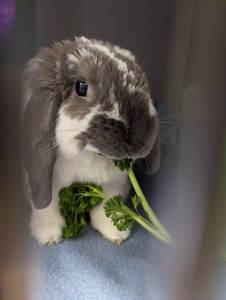 Puffy ate a lamp cord which resulted in electrocution and ingesting many tiny pieces of toxic copper. The hundreds of small wires risked perforating her GI tract, causing a toxicity, destroying her red blood cells, and putting her other organs at risk for shutting down. The shock she received when eating the wire also caused fluid to build up in her lungs. The challenge was that if chelation therapy were started before the metal passed through her intestines, the treatment would leach more copper into her blood causing additional red blood cell destruction and organ shut down. She was brough to the Avian and Exotics team at NorthStar VETS. A blood donor gave Puffy a much-needed transfusion since her PCV was 12% (normal is closer to 35-50%). Miraculously, the hundreds of metal fragments passed without getting stuck or breaking through the intestines, so chelation therapy could be started, which rid her of the rest of her toxin. Puffy is currently no longer anemic and her organs suffered no permanent damage. She is now home where her family reported she is back to her mischievous self again.
Puffy ate a lamp cord which resulted in electrocution and ingesting many tiny pieces of toxic copper. The hundreds of small wires risked perforating her GI tract, causing a toxicity, destroying her red blood cells, and putting her other organs at risk for shutting down. The shock she received when eating the wire also caused fluid to build up in her lungs. The challenge was that if chelation therapy were started before the metal passed through her intestines, the treatment would leach more copper into her blood causing additional red blood cell destruction and organ shut down. She was brough to the Avian and Exotics team at NorthStar VETS. A blood donor gave Puffy a much-needed transfusion since her PCV was 12% (normal is closer to 35-50%). Miraculously, the hundreds of metal fragments passed without getting stuck or breaking through the intestines, so chelation therapy could be started, which rid her of the rest of her toxin. Puffy is currently no longer anemic and her organs suffered no permanent damage. She is now home where her family reported she is back to her mischievous self again.
Posted in Pets, Veterinary Medicine
Tagged Avian & Exotics, copper toxicity, Kristin Britton, NorthStar VETS, Puffy, Rabbit
Leave a comment
Case Success: Rico
It was a terrible day for Rico. A fire broke out in his home, exposing him to smoke inhalation and causing great fear. When the firemen came into the house to put out the fire, Rico ran by them out of the house. As he got farther away from that danger, he ran into the street and was hit by a car.
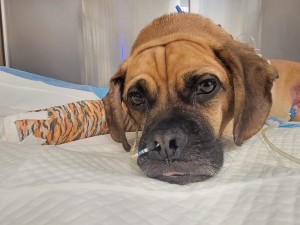 Immediately, he was brought to NorthStar VETS where the Emergency team evaluated his extensive injuries. He had a broken forearm and back leg which would require surgery, in addition to three pelvic fractures, pulmonary contusions (bruising in his lungs), a hemoabdomen (blood in his belly due to an injury on his liver), and numerous cuts and scrapes. During his eleven-day stay, the Surgery and Anesthesia teams repaired his broken bones while the Critical Care and nursing teams helped him heal and recover from his other injuries.
Immediately, he was brought to NorthStar VETS where the Emergency team evaluated his extensive injuries. He had a broken forearm and back leg which would require surgery, in addition to three pelvic fractures, pulmonary contusions (bruising in his lungs), a hemoabdomen (blood in his belly due to an injury on his liver), and numerous cuts and scrapes. During his eleven-day stay, the Surgery and Anesthesia teams repaired his broken bones while the Critical Care and nursing teams helped him heal and recover from his other injuries.
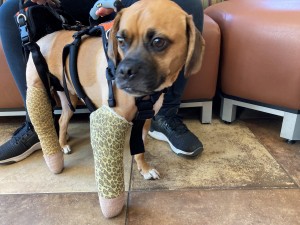 Fortunately, things are better for Rico. He is finally back with his family and feeling much better. Once he gets his casts off, life will go back to normal.
Fortunately, things are better for Rico. He is finally back with his family and feeling much better. Once he gets his casts off, life will go back to normal.
Case Success: Gaby
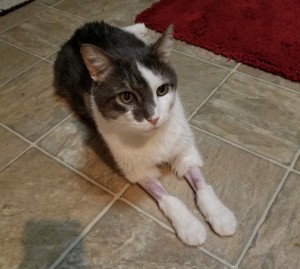 Gaby was suffering from a host of medical issues, and came in through the NorthStar VETS Critical Care service for hind-limb swelling, weakness, and an inability to urinate. A urinary catheter was placed to relieve that issue, but he had another problem with his blood. Normal packed cell volume (which is the percentage of red blood cells per unit volume,) is 35-55% and his was only 15%. An emergency blood transfusion was needed to save his life. Allison is a cat that donates to the NorthStar VETS blood bank, and recently gave blood that ended up saving Gaby by bringing his PCV back up to 26%, an exceptionally large jump! This was good enough for him to go home a couple days later while continuing to heal.
Gaby was suffering from a host of medical issues, and came in through the NorthStar VETS Critical Care service for hind-limb swelling, weakness, and an inability to urinate. A urinary catheter was placed to relieve that issue, but he had another problem with his blood. Normal packed cell volume (which is the percentage of red blood cells per unit volume,) is 35-55% and his was only 15%. An emergency blood transfusion was needed to save his life. Allison is a cat that donates to the NorthStar VETS blood bank, and recently gave blood that ended up saving Gaby by bringing his PCV back up to 26%, an exceptionally large jump! This was good enough for him to go home a couple days later while continuing to heal.
Gaby’s return home meant the world to his family because of the journey he took to get to this point. Gaby was born in Robbinsville with his brother, Buddha, in 2007. Three years later, he jumped through a screen on the second floor of his home, not to be seen again for the next ten years! About two years ago, his family received a call from a local animal hospital. A lovely woman took him in and noticed he stopped eating and was losing weight. That animal hospital scanned him for a chip, and discovered it was Gaby! He was finally reunited with his litter mate and his other pet siblings, and is catching back up with them! During his decade absence, he lost his tail, developed diabetes and heart/kidney diseases. He’s had numerous medical emergencies since his return, and NorthStar VETS has helped him manage some of those issues. His family is in gratitude for little Allison, the former stray cat who saved his life with her blood donation, and for the time they’ve had with Gaby (named after the Angel, Gabriel).
Click here to learn more about the NorthStar VETS Blood Bank and how you can get involved.
Steven Berkowitz, DVM, DACVECC
Dr. Steven Berkowitz attended St. Georges University and did his clinical year of training at University of Illinois. Dr. Berkowitz joined NorthStar VETS after service as the Chief of Emergency and Critical Care at another specialty hospital. Prior to that, he completed a three year residency in Emergency and Critical Care medicine at Oradell Animal Hospital in Paramus, NJ. His residency was completed at one of the first level one veterinary trauma centers in the United States. Prior to his residency, he was a staff emergency veterinarian at Animal Specialty Center in Yonkers, New York, as well as at Animal Emergency and Referral Center in Fairfield, NJ. Dr. Berkowitz can be seen on seasons 5 and 6 of “Animal Precinct” on Animal Planet, which was filmed at the Bergh Memorial Animal Hospital of the ASPCA wherein he did his rotating internship after completing veterinary school. Dr. Berkowitz’s professional interests include management of metabolic and endocrine emergencies, as well as management of septic patients. He is published as the primary author in the Journal of Veterinary Emergency and Critical Care with his article “Resolution of spontaneous hemoabdomen secondary to peliosis hepatis following surgery and azithromycin treatment in a Bartonella species infected dog.”
Posted in Pets, Veterinary Medicine
Tagged blood bank, blood donor, blood transfusion, Gaby, NorthStar VETS, Steven Berkowitz
Leave a comment
Case Success: Colby
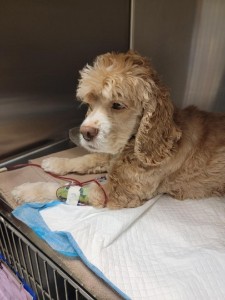 Colby, a Cocker Spaniel, came to the NorthStar VETS Emergency service for evaluation of lethargy and appetite. He was diagnosed with Immune Mediated Hemolytic Anemia (IMHA) which is an autoimmune disease where the body attacks and destroys its own red blood cells. This results in a life-threatening anemia with a high risk of pulmonary thrombo-embolism. Often, this necessitates life-saving blood transfusions. The treatment for this disease suppresses the immune system and blood transfusions are given to treat the anemia. Packed cell volume (PCV) is an indicator of the amount of red blood cells in a dog or cat. A normal dog typically has a PCV of 40-50%. Emergency transfusions are typically needed below 20%. Cocker Spaniels have a breed predisposition for this serious disease.
Colby, a Cocker Spaniel, came to the NorthStar VETS Emergency service for evaluation of lethargy and appetite. He was diagnosed with Immune Mediated Hemolytic Anemia (IMHA) which is an autoimmune disease where the body attacks and destroys its own red blood cells. This results in a life-threatening anemia with a high risk of pulmonary thrombo-embolism. Often, this necessitates life-saving blood transfusions. The treatment for this disease suppresses the immune system and blood transfusions are given to treat the anemia. Packed cell volume (PCV) is an indicator of the amount of red blood cells in a dog or cat. A normal dog typically has a PCV of 40-50%. Emergency transfusions are typically needed below 20%. Cocker Spaniels have a breed predisposition for this serious disease.
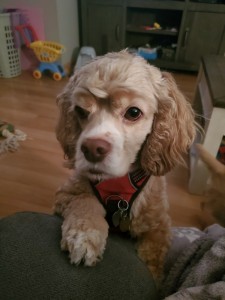 At initial presentation, Colby was noted to be severely anemic necessitating a lifesaving blood transfusion. Orson, a greyhound and blood donor, saved Colby’s life. The case was transferred to the Internal Medicine department where Colby received multiple blood transfusions and spent days in the ICU recovering under the care of the nursing staff. During the course of his hospitalization, his PCV fluctuated between 24% and 12% when Athena, another greyhound, donated as well. When his PCV rose a little more and he was stable, Colby went home and did great between rechecks. His family made sure he got his medication on time and rechecked his bloodwork as recommended. A month later, his PCV was 45% and he is eating, drinking and getting back to his old self at home!
At initial presentation, Colby was noted to be severely anemic necessitating a lifesaving blood transfusion. Orson, a greyhound and blood donor, saved Colby’s life. The case was transferred to the Internal Medicine department where Colby received multiple blood transfusions and spent days in the ICU recovering under the care of the nursing staff. During the course of his hospitalization, his PCV fluctuated between 24% and 12% when Athena, another greyhound, donated as well. When his PCV rose a little more and he was stable, Colby went home and did great between rechecks. His family made sure he got his medication on time and rechecked his bloodwork as recommended. A month later, his PCV was 45% and he is eating, drinking and getting back to his old self at home!
 Adam Miller, DVM, DACVIM
Adam Miller, DVM, DACVIM
Dr. Adam J. Miller is a native of Buffalo, New York and received his veterinary degree from St. George’s University having completed clinical rotations at Cornell University in 2015. He completed an intensive Small Animal Rotating Internship in Medicine and Surgery with VCA in Norwalk, Connecticut before returning to Cornell University for a three-year residency in Internal Medicine. Dr. Miller’s professional interests include nephrology, gastroenterology, and immune-mediated disease.
Outside of work, you will find him trying new restaurants, watching football (Go Bills!) or documentaries, or enjoying the outdoors with his affectionate Newfoundland, Isabelle.
One Masked Client per Pet in the Building
On Monday, December 27, 2021, we took steps to increase safety for our clients and staff which is our highest priority, and we will continue to follow protocols outlined by the state.
One masked pet parent will be able to enter the building with their pet. Plexiglass shields have been installed in our lobby along with touchless payment options. We ask that everyone maintain social distancing practices and utilize the hand sanitizing dispensers located throughout the facilities.
For pet parents wishing to safely remain in their vehicle, our staff will come out to receive your pet and communicate via phone to limit face-to-face contact.
We thank you for your patience and understanding, and hope that you are staying healthy and safe during this time.
The NorthStar VETS Team
An Open Letter to the Community
We know how difficult the last year and a half has been on you, especially for those of you who in addition to everything else, also experienced a sick or injured pet, or the loss of a beloved companion. The intent of this letter is to inform you of what is happening in the veterinary world so you have greater understanding should you need to visit us.
For a few reasons right now, demand for veterinary care is at unprecedented levels. When the world first sheltered in place, people noticed more of their pet’s behavior during the day, but avoided unnecessary trips like veterinary well visits. A few months in, there were more pet health issues identified, some of which progressed to more serious conditions, and a backlog to visit general practices. In addition, general practices had to adapt, sometimes closing or limiting caseload for weeks at a time. All of this led to more cases coming to NorthStar VETS.
The pandemic also forced veterinary hospitals to find completely new and less-efficient ways to serve patients and clients. Emphasizing safety over speed, curbside protocols had the negative side effects of increased phone call volume, less face-to-face contact, and slower-than-normal processes. That reduction in efficiency, combined with greater demand, suddenly made us short-staffed. Unlike other service industries, the people we hire are highly-trained medical professionals, difficult to find under normal circumstances. In spite of all this, we worked tirelessly, never closing our doors, to simultaneously serve patients and clients, improve processes, and scale up our team.
By the one-year mark of the pandemic, the general public was in a worse place than they were before. Politically, socially, and attitudinally divided, people’s emotional exhaustion and anxiety were overwhelming, and their patience wore thin. When starting from that place, the stress of a suddenly sick or injured pet combined with long wait times at the emergency clinic wreaked havoc on our interactions with clients. Our team, already suffering from overwork and the emotional toll of handling many tough cases, were further demoralized by inconsiderate comments, online posts, and poor treatment by some of the people they helped. As a result, the veterinary industry has never had more people leave the jobs they love, never to return, making worse a short-staffed situation.
Even though the world changed, our commitment did not. NorthStar VETS is still a team of dedicated professionals committed to improving quality of life for patients, clients, our referring veterinary hospitals, and each other. When you come to one of our locations, know that we are operating under extremely difficult circumstances, but will give you and your pet our very best care. Please arrive with the knowledge that wait times are greater, but we are still here for you and your pet. We appreciate you and your patient understanding.
Sincerely,
The Grateful Staff of NorthStar VETS





